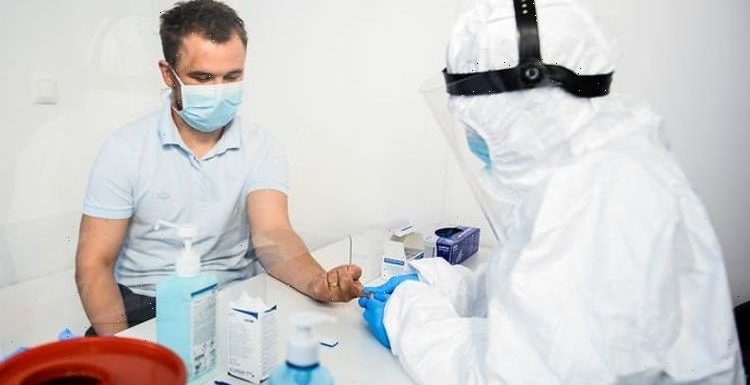
Donald Trump booed after recommending Covid vaccine
We use your sign-up to provide content in ways you’ve consented to and to improve our understanding of you. This may include adverts from us and 3rd parties based on our understanding. You can unsubscribe at any time. More info
The antibody therapy reduced the risk of participants developing COVID-19 symptoms by 77 percent, according to the drugmaker. It opens up the door to an alternative option for people who may not see the full protective benefits from the currently authorised vaccines. The PROVENT pre-exposure prophylaxis trial showed AZD7442 could potentially provide long-lasting protection with demonstrated clinical trial success.
AstraZeneca said that 75 percent of participants in the stage three trial — comprising two types of antibodies that were discovered by Vanderbilt University Medical Centre in Tennessee — had chronic conditions, including some with a lower immune response to vaccinations.
Similar therapies are being developed by Regeneron, Eli Lilly and GlaxoSmithKline with its partner, Vir.
Sir Mene Pangalos, Executive Vice President of BioPharmaceuticals R&D at AstraZeneca, said the results were recorded three months after antibodies were injected and that researchers would probe the subjects again at 15 minths.
Sir Mine said: “No other company has delivered two molecules against SARS-CoV2.


“This definitely helps us in positioning us in terms of Covid.”
It comes after Health Secretary Sajid Javid announced antibody drug Ronapreve will “be rolled out to NHS patients as soon as possible”.
Prime Minister Boris Johnson hailed it as “an important weapon in fighting Covid, particularly for those who are immuno-compromised.
He said that the Medicines and Healthcare products Regulatory Agency (MHRA) “has approved the first therapeutic treatment designed specifically for Covid-19.
“Alongside our life-saving vaccine programme, this will be an important weapon in fighting Covid.”

Ronapreve was taken by Donald Trump after the former US president tested positive for coronavirus last October.
Unlike treatments such as dexamethasone which calm an overactive immune response, Ronapreve – known as Regen-Cov in America – targets the virus directly. It has two lab-made antibodies that bind to the virus’s spikes, stopping it entering cells and spreading.
The “monoclonal antibodies” are artificial proteins that act like natural human antibodies.
People with compromised immune systems struggle to produce those proteins that fight off bugs.
Mr Javid said: “This treatment will be a significant addition to our armoury to tackle Covid-19 – in addition to our world-renowned vaccination programme and life-saving therapeutics dexamethasone and tocilizumab.
DON’T MISS
Black hole shock: Scientist’s dire warning to humans [VIDEO]
Asteroid apocalypse: Scientist warns of ‘city-destroying’ space rock [OPINION]
Why ‘Trillion tonne rock hurtling towards Earth’ was ‘bad news’ [EXPLAINED]


“We are now working at pace with the NHS and expert clinicians to ensure this treatment can be rolled out to NHS patients as soon as possible.”
In March, concerns were been raised over blood-clotting events associated with the AstraZeneca vaccine.
One month later, the safety committee of the EMA concluded that there may be a link between the AstraZeneca vaccine and very rare cases of unusual blood clots.
These rare blood clots occurred in veins in the brain, the abdomen and in arteries, in combination with low levels of blood platelets.
The announcement came on the heel of dozens of European countries, including Germany and France, suspending their use of AstraZeneca.
French President Emmanuel Macron openly denigrated the AstraZeneca vaccine in January, calling it “quasi-ineffective”.
The repercussions are said to have had a disastrous impact on the European and the global vaccination campaign.
Source: Read Full Article